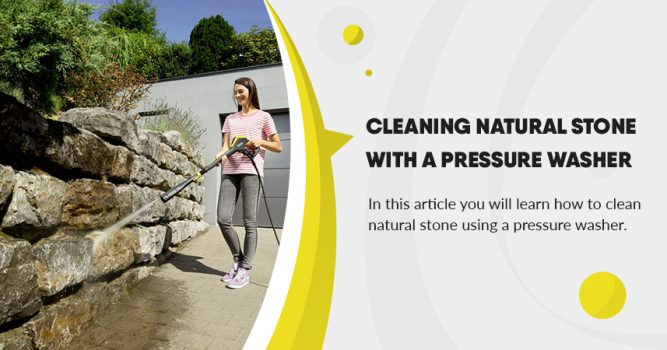Different natural stone has very different properties. All softer stones must not be treated with a pressure washer. Some hard stones can tolerate gentle water pressure. However, the majority of experts and professionals generally advise against cleaning natural stone with a pressure washer.
Many natural stones do not tolerate water pressure
In the majority of cases, when cleaning natural stone, it can be assumed that pressure washers and acids are the covering’s greatest enemies. Many users and manufacturers consider their use to be unproblematic, at least with hard stones such as granite.
There are many natural stones that appear obviously hard, but are very porous and have a soft structure. They must never be cleaned with a high-pressure cleaner, as their surface, structure and substance will be damaged, which is not always immediately apparent.
Also of interest: Powerfully clean paving stones with a high-pressure cleaner
The following soft natural rocks are among the sensitive and softer rocks:
- Limestone or travertine
- Marble
- Polished granite
- Sandstone
- Terracotta
The following rocks have a higher density, which makes them hard stones that can be carefully cleaned with water pressure:
- Basalt
- Gneiss
- Quartzite
- Slate
- Unpolished granite
Whether using a pressure washer or a high-pressure washer, the suitable tools and substances for cleaning natural stone are severely limited.
Also of interest: Clean stone slabs with pressure washer
Pressure washers increase the rate of contamination
Besides the risk of damaging the stone structure and substance, there is another crucially important aspect. A pressure washer makes the surfaces of all natural stones rougher. This has the counterproductive effect of making it much easier for new dirt to accumulate. Any impregnations that may have been washed out also support the growing level of dirt.
Paradoxically, this cycle ensures that shorter and shorter cleaning intervals become necessary and that the effect is intensified with each application of water pressure. Just as paradoxically, the effect of high pressure water impact is that the existing dirt is not removed from the natural stone, but is pressed deeper into it. In this way, the dirt “hides” for a short time and sooner or later comes to light again.





.jpg)


